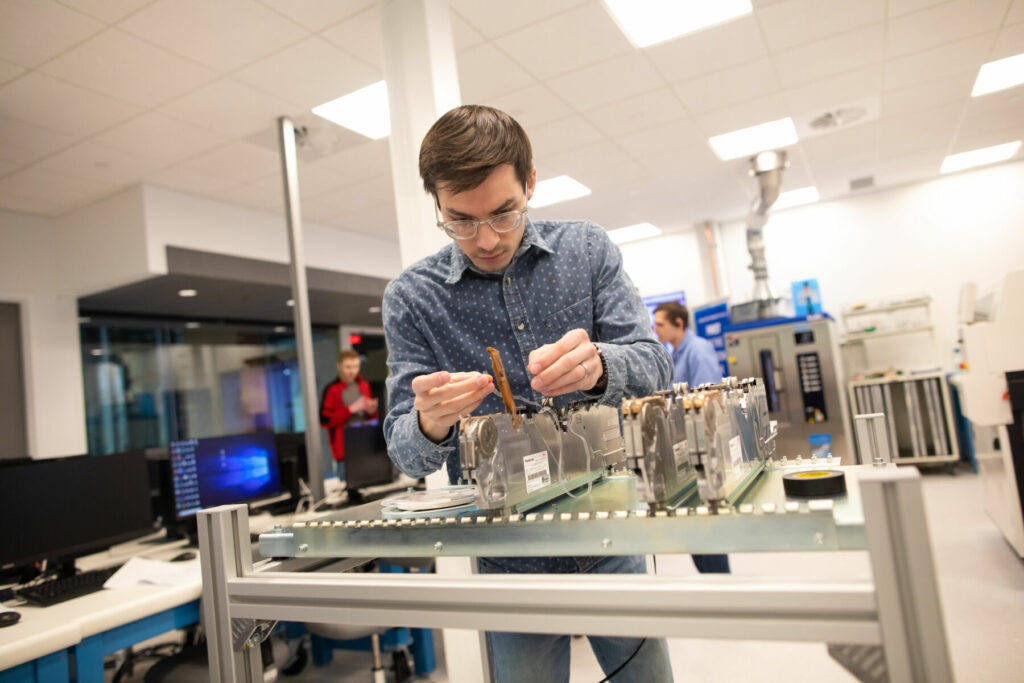2022 grads
Bachelor of Applied
Science degree in MEMS
Four students earn Bachelor of Applied Science degrees in microelectronic manufacturing
Lorain County Community College conferred four Bachelor of Applied Science in Microelectronic Manufacturing (MEMS) degrees during its 58th commencement ceremony on May 14. LCCC has been training students in the field since 2013 when it became the first community college to offer an associate degree in MEMS. The college made history again in 2018 as the first community college to deliver an applied bachelor’s degree in the area.
“Our MEMS program has been a game-changer for students who are looking to break into the exploding MEMS, sensors and semiconductor industries,” says LCCC President Marcia J. Ballinger, Ph.D. “We started this program after listening to the needs of local employers and forecasting nationwide industry trends. When students graduate from our MEMS program, they aren't just prepared for great careers ahead, they've already started them.”
LCCC’s MEMS program is delivered in an effective and replicable “earn and learn” format where students work while attending college. Often times the local company at which a student completes their internship offers a full-time position upon graduation. Not only does this model of learning give students opportunities to gain work experience while they are in school, making themselves more attractive to future employers, it allows students to earn a livable wage as they complete the program.
Paul Gonzalez, of Avon Lake, has been working at Lincoln Electric during most his time in the program. He started out assisting the Quality Assurance team and then moved into manufacturing engineering.
“I’ll have a full-time job with Lincoln Electric with benefits and everything, right out of college,” Gonzalez, 23, says.
Jonathan Ellis of Lorain, who found out about the program from his grandmother who saw it on a news segment, also has a full-time position waiting for him this spring. It’s with a local company that repairs bitcoin miners, where he’s been working part time while in school.
“There is a job waiting for me and I’m currently at a job right now,” Ellis, 22, says. “They have a structure laid out for me when I graduate.”

The earn and learn format, along with the low cost of community college tuition, have been significant drivers of growth for both the associate and bachelor’s degree programs. Enrollment over time in both MEMS programs combined has increased from three students in 2013 to 153 in 2022.
Kurtis Jeffries of Norwalk was planning to move out of state before meeting his wife. He started looking for local career opportunities and attended a MEMS info session.
“I got to take a tour of the clean room and get a better idea of what the program was like,” Jefferies says. “I took one course that summer and that’s when I solidified that I was going to get into this degree.”
Jeffries, 28, gained his workplace experience at Dan-Mar Company, an industry leader in contract engineering, design, development and manufacturing of electronic products. He says the immediate hands-on experience, direct line to employers, and quick time to degree confirmed he made the right choice.
“I feel like I kind of cheated in a way; like it’s too good to be true,” Jeffries says. “The work that the program director and all the supporting staff have done to make this degree so palatable to local industry has really made a huge difference in all of the students’ lives.”
Work-based learning is a staple in many LCCC programs and Cody Wootton of Avon Lake thinks that approach helps set LCCC apart from other higher education institutions. Wootton joined the MEMS program after leaving a four-year university and says the curriculum was in-depth and hands on from the beginning.
“From day one you’re in there, learning how to gown up, soldering circuit boards,” Wootton, 26, says. “You’re finding out how things work, how to do things, and you’re actually experiencing it.”
Wootton, who has been working at embedded hardware and software solutions provider LogiSync, says part of what makes the MEMS program in particular so unique is associate professor, Johnny Vanderford.
“His dedication and commitment to this program should not go unrecognized,” Wootton says. “I transferred in from a four-year university and those kinds of professors do not exist at other colleges.”
Vanderford says the program has always been a groundbreaking one, but recent national news has magnified his enthusiasm. Vanderford is referring to Intel bringing its most advanced chip manufacturing operation in the world to Ohio.
“It’s monumental; it’s beyond anything I thought I’d be here for as a community college,” Vanderford says. “To know that we’ve already been training students in the microelectronic processes that Intel and resulting supply chain companies will need access to solidifies LCCC's position as a leading provider within the talent pipeline.”



